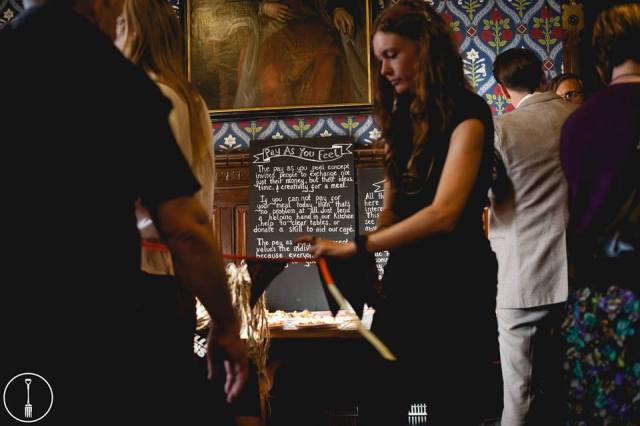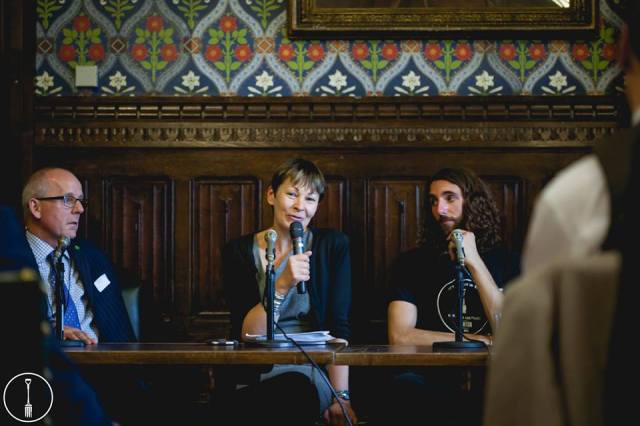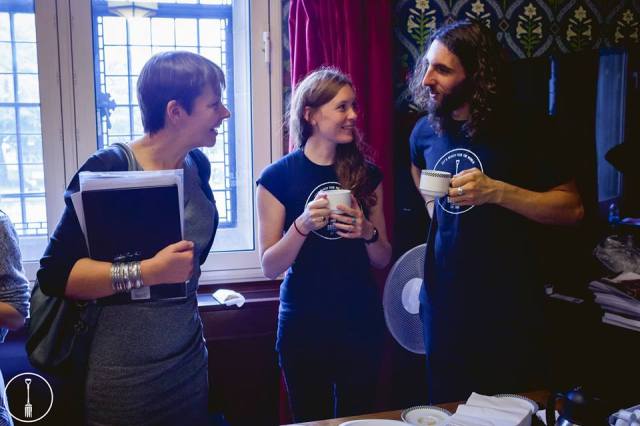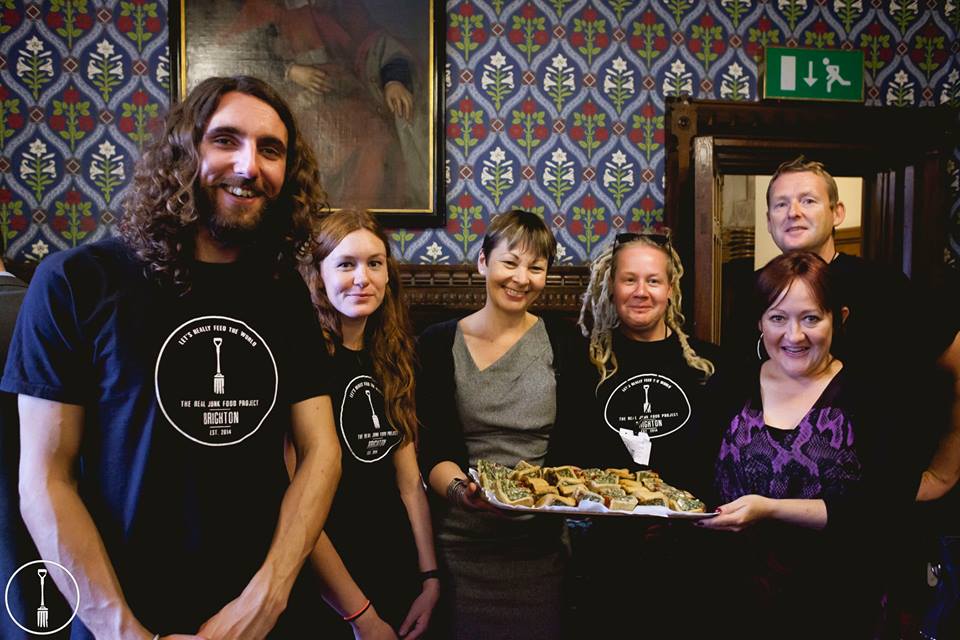On Tuesday 8th September, The Real Junk Food Project Brighton fed MP’s a wasted food buffet in the Houses of Parliament. Why? In support of Kerry McCarthys “Food Waste (Reduction) Bill”.
Here is my account of the event and her thoughts on the food waste (reduction) bill – also published on trjfpb.blogspot.com
Supporting Kerry McCarthy’s Food Waste (Reduction) Bill in the Houses of Parliament, was a very interesting yet surreal experience. If someone had told me last year that I would be serving wasted food to MPs in Westminster, I would have laughed, but after being on-board with The Real Junk Food Project Brighton for the past nine months, nothing now surprises me. Security checks, sniffer dogs, and parking our little red (1993) Rascal beneath Big Ben were new experiences which I won’t forget in a hurry, but it was being permitted inside Parliament that was most surreal.
We were granted access to the Jubilee room fifteen minutes before the event began, which left little time to construct our buffet. A selection of 120 vegan, vegetarian, and meat canopes, pre-baked pies, organic fair trade chocolates, and pastries. Wasted food. Every last delicious mouthful of it. We presented our wasted food buffet in our usual style, hand made bunting, up-cycled info-boards, and flyers. It was odd to consider the origin of everything on display as we stood in the most self-indulgently decorated room I had ever seen. To me, our modest community centre on our local council estate felt much more inviting. Despite so little time, as usual we all came into our own- like well versed ants preparing a new hive. We had catered for important events before, but this time we were not just representing ourselves, we were representing The Real Junk Food Project Charitable Network as a whole. Adam Smith, the Network Founder, commented on my facebook update as I tried and failed not to over do it on the hummus. No pressure.

By 3:05pm the room was filled with MPs and we found ourselves conversing with Caroline Lucas and Kerry McCarthy about the ethics of wasting food. As the speeches began, we proudly stood in front of our wasted food buffet as we were thanked by each guest speaker for providing a wonderful spread and a great service to our environment and community. At that precise moment, I couldn’t help but notice the smell of hypocrisy as I spotted several unopened bottles of water left over from the event before, each one labelled with the Westminster emblem…no tap water or evian here. I remembered the petition I had recently signed, asking for the removal of the £1.3 million subsidies for the catering service in the House of Lords. The lavishly decorated room was not lost on me as I pictured what little many of the people we feed back at home have available to them. Yet I was also surprised by the way in which these MPs spoke passionately about the need to reduce food waste and food poverty. I was very impressed by the number of representatives from different food organisations and charities that were present within this one small room in Parliament. It was the first time I’d seen evidence that political debate includes the views of those they are debated about from rooms similar to this one. It was nice to hear Lindsay Boswell, CEO of Fare-Share, openly question aspects of the food waste bill. Niki Charalampopoulou, Managing Director of Feedback, spoke of their research in Kenya where they found farmers were forced by supermarkets to waste up to 50% of their food produce without any compensation due to cosmetic demands.

Caroline Lucas, Green Member of Parliament Brighton Pavilion, speaking of work of The Real Junk Food Project in Brighton.
After the speeches, food waste campaigning organisations including This is Rubbish. The Rubbish Diet, WWF-UK, Friends of the Earth, and Sustain bustled about the room sharing their views on food waste with MPs, all with waste food canopes in hand.
It was refreshing to see a Parliamentary conversation that includes not just MPs, but those who work first hand with people living in food poverty, and who work tirelessly to collect, sort, and redistribute wasted food. Yet even a week after this event and having read and re-read the food waste (reduction) bill…I still can’t quite see how this bill is going to be truly effective.
So what is really in the Food Waste (Reduction) Bill?
In short (and I quote):
The Bill seeks to ensure that more of the obscene amounts of food needlessly wasted through the food industry supply chains- from farm, to production, through to retail- is prevented or made available to charities, for redistribution to people living in food poverty.
Sounds great doesn’t it! Does it? Firstly, the provisions within the bill only apply to “in-date” food. Yet most edible food which is thrown away in supermarkets is out-of date (food which has passed it’s sell-by date). Since February, The Real Junk Food Project Brighton have intercepted over 10 tonnes of edible food from supermarkets-with only a small proportion including items of damaged packaging or over-ordered stock. Most of what we intercept, re-distribute, cook with, and serve, is out of date food. Yet we are the most accessible healthy food options in our city, ensuring all our meals are highly nutritious and varied. Why not teach people to trust their senses and re-address the absurdity that is sell-by-dates? Cured meats, tinned goods, and pickled veg, to name a few are all PRESERVED to last a long time, we knew this in the war, so why have we forgotten it now?
Secondly, no where can I find in this bill, any suggestion of financial assistance to the charities which would be responsible for taking on this wasted food. I was really shocked to find in this bill a quote from FareShare, that claims food redistribution to food charities is more costly than landfill and anaerobic digestion, at the cost of “between £60-£100 per tonne for transportation alone”.
WHAT?! This means that The Real Junk Food Project Charitable Network, are missing a trick! In the last 18 months the network as a whole has saved 107, 000 tonnes of food…for free. That’s between £6, 420, 000 – £10, 700, 000 that we’ve apparently missed out on.
So who is it that is currently profiting from wasted food and food poverty? How can a charity be effective in it’s mission if it’s charges alone act as a disincentive to supermarkets, that means throwing edible food away when people go hungry is actually the preferable option? Of course it is correct for the Food Waste (Reduction) Bill to include comment as to the financial barriers to food re-distribution, but surely there should be more emphasis given to why these costs are so great- particularly when our network are not bound to these same financial restrictions. So it appears to me that the people working with wasted food are not always the good guys. Surely food, particularly wasted food, should be freely accessible to those who need it. No sign-up fees, no additional charges, just edible food going in bellies not bins. There clearly needs to be incentives for both sides of food re-distribution so that charities are well equipped to cope with even more wasted food, and supermarkets have incentives to work with them.
With this in mind, the Food Waste (Reduction) Bill, includes suggestions that supermarkets could be given incentives to redistribute wasted food via charities, in the form of tax reductions per tonne of redistributed food. So where’s the incentives for the charities dealing with this wasted food? In Brighton, we already spend in transportation costs alone, ~£60 per week. Since February this year we have intercepted over 10 tonnes of food (which we now know to be a saving of between £600-£1, 000 for our donor supermarket!) so where is our support to take on more? We would need more storage (£), more vans (£), more petrol (£), and more time- which currently we all already give for free. What I found most bizarre however, was that within this bill, it is openly recognised that “redistribution receives no subsidies or support” …yet at no point is support for charities proposed here.
Another confusing statement within this bill: the recognition that a) the UN have recently agreed to a target of halving food waste by 2020, and b) that THIS BILL insists on no less than a 30% food waste reduction by 2025. Why not go the full hog and match the UN? But, it has to be said, there is also the argument put forth that food waste in the EU could rise by 20% by 2020 if no action is taken, and a reduction in global food waste by just 25% would leave enough food to feed everyone on the planet. So this is for you to decide: is this bill proposing enough?
The biggest positive of the Food Waste (Reduction) Bill has to be, without question, the provision of documentation: all supermarkets would be required to document their food waste statistics- Just as Tescos have done this year. I can not find fault in this. This in itself, would create more job opportunities within stores, and if each charitable food donation was sorted, weighed, and documented, it would save charities the resources to do it themselves. One little thing though- there was comment during the Parliamentary event that retail food waste figures are largely unknown- clearly no-one asked The Real Junk Food Project network who has been collecting this information since 2013. A quick google would have also have shed some light.
Do I support the food waste (reduction) bill?
Yes I personally support the Food Waste (Reduction) Bill, because yes I do think supermarkets should be forced into transparency (as proposed by this bill). I think supermarkets should do more to save food (as proposed by this bill). But no. I don’t think it’s enough. I don’t think it’s even close. But it’s a start. It’s a start of a conversation which for too long has gone unspoken.

From left to right: TRJFPB Founder Adam Buckingham, TRJFPB director Jess Hooper, Caroline Lucas Green MP, TRJFPB director Sarah Betts, Kerry McCarthy Labour MP, TRJFPB director Nick Saxon.

Caroline Lucas, Jess Hooper, and Adam Buckingham, speaking of reducing food waste and food poverty in Brighton.
One REALLY important thing to remember:
The Real Junk Food Project started because no one of any “power” was doing anything to help people going hungry whilst edible food was shamefully being tossed in the bin. If I’ve learnt anything from the event it is this: regardless of the Food Waste (Reduction) Bill, if a group of normal people, volunteers from varying backgrounds who only met through their shared passion for equal access to food, can feed members of parliament wasted food, we can certainly positively impact food poverty and food waste in our respective locations. The rest is what it is, but we will keep saving food and we will keep feeding people.
Let’s REALLY feed the world.

The Real Junk Food Project Brighton team at Parliament. From left to right: Imogen Richmond Bishop, Paul Loman, Nick Saxon, Sarah Betts, Jess Hooper, Adam Buckingham.
*On September 9th The Food Waste Reduction Bill entered Parliament and has been given leave to proceed – without being forced to a vote. Its second reading has been scheduled for 29th January 2016, which we will be following closely. More information about the food waste bill, aptly named “what a waste” can be found on facebook here.














